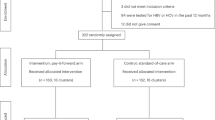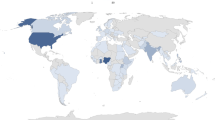Abstract
Medical case management (MCM) is a core medical service in The Ryan White HIV/AIDS Program and aims to provide treatment and care for people living with HIV/AIDS by engaging, identifying and eliminating barriers to HIV care. Little research has examined the impact of this intervention; therefore, the purpose of this study was to examine the how MCM affects HIV clinical outcomes. The study took place at a midwestern, outpatient infectious diseases clinic. This study utilized a longitudinal, retrospective study design to analyze to the impact of MCM engagement on HIV clinical outcomes (viral loads, CD4 counts) from 2009 to 2015 as a time-varying predictor. A total of 2773 patients were included in this study, of which 975 patients (35.2%) engaged in MCM. Among those in MCM, approximately 90% of the population were between 25 and 64 years of age, more than three-quarters were African American men, mean time of HIV care engagement in at this clinic care was 3.2 (± 4.1), while mean years living with HIV was 10.5 (± 7.1). Throughout the study period, those engaged in MCM had a significantly faster improvement in their HIV clinical outcomes compared to the non-MCM group (p < 0.001). The study highlights the significant impact MCM services have on improving CD4 T cell counts and HIV viral loads. The successful care coordination that MCM offers clearly improves health outcomes while creating a network of patient care.
Resumen
Administración de casos médicos (MCM) es un núcleo de servicio médico en la Ryan White VIH/SIDA programa y su objetivo es proveer tratamiento y cuidado de las personas que viven con VIH/SIDA por participar, identificar y eliminar barreras para el cuidado del VIH. Poca investigación ha examinado el impacto de esta intervención; por lo tanto, el propósito de este estudio era examinar cómo MCM afecta los resultados clínicos del VIH. El estudio tuvo lugar en una medio oeste, en una clínica de enfermedades infecciosas de pacientes ambulatorios. Este estudio utilizó un diseño del estudio longitudinal, retrospectivo para analizar el impacto del compromiso de MCM en los resultados clínicos de VIH (carga viral, recuentos de CD4) desde 2009 hasta 2015 como un predictor de variables en el tiempo. Un total de 2.773 pacientes se incluyeron en este estudio, de los cuales 975 pacientes (35.2%) a MCM. Entre los MCM, aproximadamente el 90% de la población entre 25 y 64 años de edad, más de tres cuartas partes eran hombres afroamericanos, tiempo medio de compromiso de atención de VIH en esta atención clínica 3.2 (± 4.1), mientras que el promedio de años que viven con VIH fue 10.5 (± 7.1). Durante el período de estudio, quienes se dedican a MCM tuvieron una mejoría significativamente más rápida en sus resultados clínicos de VIH en comparación con el grupo no-MCM (p < 0001). Los aspectos más destacados fuel el impacto de los servicios MCM en mejorando los recuentos CD4 y carga viral de VIH. La coordinación de la atención acertada que MCM ofrece mejora claramente los resultados de salud, creando una red de atención de los pacientes.


Similar content being viewed by others
References
CDC. CDC-Funded HIV Testing: United States, Puerto Rico and the U.S. Virgin Islands. 2013.
DHSS. Ryan White HIV/AIDS Treatment Modernization Act: U.S. Department of Health and Human Services; 2006. http://hab.hrsa.gov/abouthab/modernact2006.html.
Arredondo M, Garrido C, Parkin N, Zahonero N, Bertagnolio S, Soriano V, et al. Comparison of HIV-1 RNA measurements obtained by using plasma and dried blood spots in the automated abbott real-time viral load assay. J Clin Microbiol. 2012;50(3):569–72.
Gardner LI, Metsch LR, Anderson-Mahoney P, Loughlin AM, Rio Cd, Strathdee S, et al. Efficacy of a brief case management intervention to link recently diagnosed HIV-infected persons to care. AIDS. 2005;19(4):423–31.
Katz MH, Cunningham WE, Mor V, Andersen RM, Kellogg T, Zierler S, et al. Prevalence and predictors of unmet need for supportive services among HIV-infected persons: impact of case management. Med Care. 2000;38(1):58–69.
Kushel M, Colfax G, Ragland K, Heineman A, Palacio H, Bangsberg D. Case management is associated with improved antiretroviral adherence and CD4+ cell counts in homeless and marginally housed individuals with HIV infection. Clin Infect Dis. 2006;43(2):234–42.
Purcell DW, DeGroff AS, Wolitski RJ. HIV prevention case management: current practice and future directions. Health Soc Work. 1998;23(4):282–9.
Yehia BR, Stewart L, Momplaisir F, Mody A, Holtzman CW, Jacobs LM, et al. Barriers and facilitators to patient retention in HIV care. BMC Infect Dis. 2015;15:246.
Shacham E, López JD, Brown TM, Tippit K, Ritz A. Enhancing adherence to care in the HIV care continuum: the barrier elimination and care navigation (BEACON) project evaluation. AIDS Behav. 2018;22:258–64.
Brennan-Ing M, Seidel L, Rodgers L, Ernst J, Wirth D, Tietz D, et al. The impact of comprehensive case management on HIV client outcomes. PLoS ONE. 2016;11(2):e0148865.
Montarroyos UR, Miranda-Filho DB, César CC, Souza WV, Lacerda HR, Militão Albuquerque MdFP, et al. Factors related to changes in CD4+ T-Cell counts over time in patients living with HIV/AIDS: a multilevel analysis. PLoS ONE. 2014;9(2):e84276.
Baum MK, Rafie C, Lai S, Sales S, Page B, Campa A. Crack-cocaine use accelerates HIV disease progression in a cohort of HIV-positive drug users. J Acquir Immune Defic Syndr. 2009;50(1):93–9.
Webber MP, Schoenbaum EE, Gourevitch MN, Buono D, Klein RS. A prospective study of HIV disease progression in female and male drug users. AIDS. 1999;13(2):257–62.
Sikkema KJ, Kelly JA, Winett RA, Solomon LJ, Cargill VA, Roffman RA, et al. Outcomes of a randomized community-level HIV prevention intervention for women living in 18 low-income housing developments. Am J Public Health. 2000;90(1):57–63.
Metcalf CA, Malotte CK, Douglas JM Jr, Paul SM, Dillon BA, Cross H, et al. Efficacy of a booster counseling session 6 months after HIV testing and counseling: a randomized, controlled trial (RESPECT-2). Sex Transm Dis. 2005;32(2):123–9.
Ybarra ML, Bull SS, Prescott TL, Korchmaros JD, Bangsberg DR, Kiwanuka JP. Adolescent abstinence and unprotected sex in CyberSenga, an Internet-based HIV prevention program: randomized clinical trial of efficacy. PLoS ONE. 2013;8(8):e70083.
Service CR. The Ryan White HIV/AIDS Program: overview and impact of the Affordable Care Act. 2015.
Crowley JS, Kates J. The Affordable Care Act, the Supreme Court, and HIV: what are the implications. The Henry J Kaiser Family Foundation. 2012.
Acknowledgements
We would like to thank the patients and staff at the Washington University Infectious Diseases Clinic. The authors would also like to acknowledge Jessica Grubb, M.D., Hong Xian, Ph.D., and Jeremy Green, Ph.D. for their consultation in this work.
Author information
Authors and Affiliations
Corresponding author
Ethics declarations
Conflict of interest
The authors report no conflicts of interest.
Ethical Approval
All procedures performed in studies involving human participants were in accordance with the ethical standards of the institutional and/or national research committee and with the 1964 Helsinki declaration and its later amendments or comparable ethical standards.
Informed Consent
Informed consent was obtained from all individual participants included in the study.
Rights and permissions
About this article
Cite this article
López, J.D., Shacham, E. & Brown, T. The Impact of the Ryan White HIV/AIDS Medical Case Management Program on HIV Clinical Outcomes: A Longitudinal Study. AIDS Behav 22, 3091–3099 (2018). https://doi.org/10.1007/s10461-018-2124-3
Published:
Issue Date:
DOI: https://doi.org/10.1007/s10461-018-2124-3




